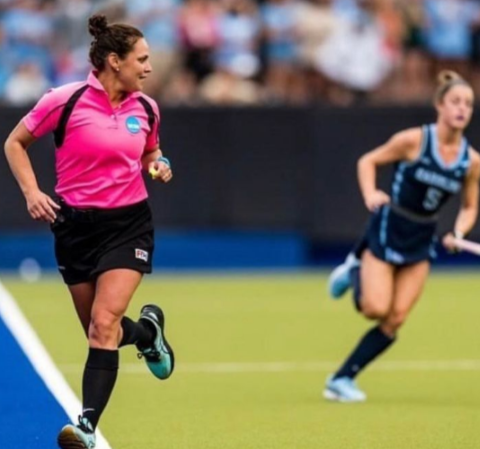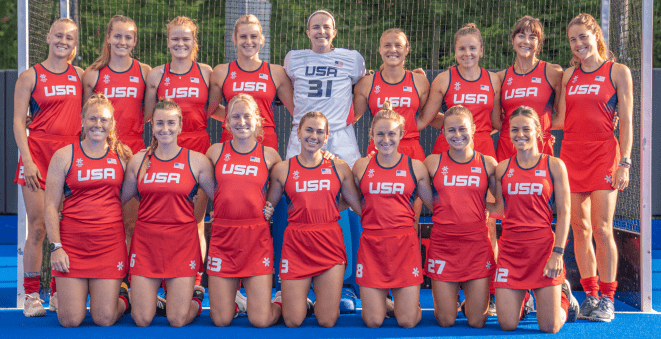*This is a republication from the fall of 2022.*
What is it like to be an umpire or referee?
I have 12 years of experience that includes PIAA, NCAA, and International umpiring. I’ve had amazing opportunities to view the most beautiful sides of sports and the world.
The fall season does not start in August, it starts in January for me. I start my season just like a player – lifting and training – and continue to make gains until the August preseason. Just like a player, I want to be as strong, healthy, fast, and fit as I can be from August to December.
My body needs to withstand many miles each week of running, cutting, and sprinting. And, then recover quickly while traveling thousands of miles between each game.
Pressure is the first word that comes to mind when you are on a big game or a televised game. You know that every call, signal, and movement will be judged. I have to get hyped up, just like I did when I played. Each game is meaningful, and I try to pretend that each game is a championship.
After a highly intense game, it takes hours to come down from the adrenaline. You are starving and cannot wait to eat. You are dehydrated and want to chug water. You are anxious to watch some of the clips that you may be still questioning in your head.
It’s late at night, and you are stuck in a random hotel traveling to the next game. After all that hype and excitement, your mind is still and quiet and you are processing what just happened. Your body feels tight, and you know you need a good night’s sleep so you can perform tomorrow on the next game. You need to learn and then put it away and move on to the next game – learn something each game.
Last week, I flew out Thursday, rented a car, and then drove to a hotel. Finding healthy food on the road, keeping my body in shape, and showing up to the game ready and focused, leaving all my personal and professional life blocked out for three hours while I’m at the NCAA facility. You’ll umpire two-to-three games in three days, then it’s time to go home.
When a game goes into overtime or shootouts, umpires possibly miss flights, or a flight might be bumped back. I’ve been known to run through TSA, not totally put together. It’s travel, so you encounter what others encounter and that’s the possibility that you’ll arrive at your next airport, where everything is closed and you’re hangry. And, while your stomach is growling, you are replaying some of the parents’ comments in your head, “you suck ref.”
Arriving home late on a Sunday, you have your personal life ahead of you and your professional responsibilities. And, then you need to review some clips from your weekend games and make the adjustments for the next game. Add on finding time to get your uniform cleaned for the upcoming weekend. Also, your body is beat up, so you need to hit the weight room on Monday and get your mobility work in.
Did you know that umpires watch our games and study them just like a player or a team would? I look at my positioning and looking why I missed something. If I take one step to the side, I would have seen that. On that goal, I should have been in the picture, why was I so far out? Did I not anticipate that aerial, and get caught too far up? Why did I allow the players to crowd me? In my head, I thought it was one player, but seeing the video, there are four players.
For me, I don’t remember who won the game the next day. The most important goal I have each game is to leave the field with no controversy and all players are healthy. I want to be predictable, and I want every player to know if a card is coming – no surprises.
If I give a hard whistle, I want you to know that next time that happens anywhere on the field, I’m giving a card or possibly upgrading for a corner inside the 23-meter. I compare it to parenting. If I tell my child they are in time out, if they do such and such, and then they do that thing, I have to follow through or I will lose control of the game and players could get hurt. I know if my whistle is quick, then there is lesser chance a player will get hurt.
Once your playing days are finished, you will miss the excitement and adrenaline of a game. Umpiring can fill that void and keep you close to the game that you love and adore.
I think it’s incredibly beneficial if you can get a whistle in your hand while you are still playing. You will realize how difficult it truly is and start to understand why certain things are called the way they are. Umpires and referees are trying to be fair. They will never call the perfect game, just like a player will most likely not have a perfect game. But it’s how the umpire reacts after that poor call that makes or breaks them.
Before you raise your hand, question a call, or yell at your umpire – remember they are human. Thank your umpire or referee after your next match and tell your fans to be kind.




